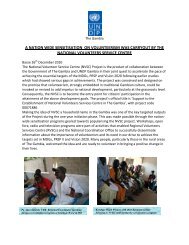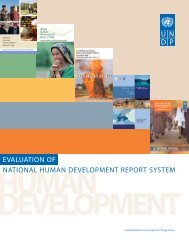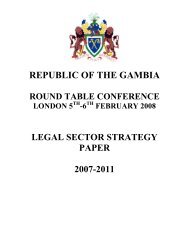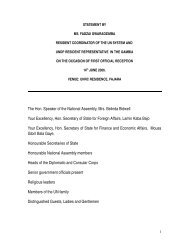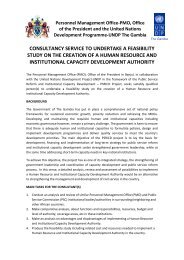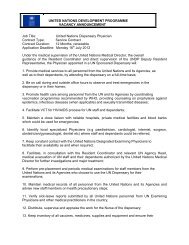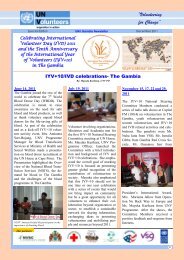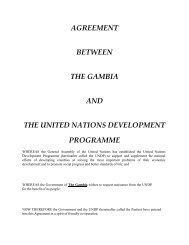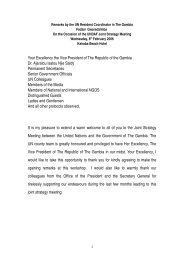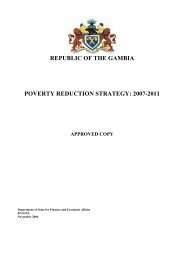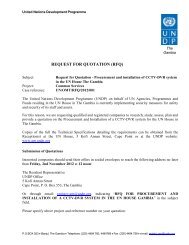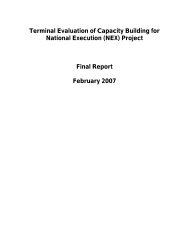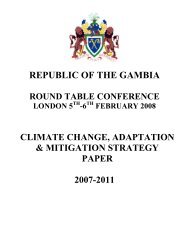Introduction - UNDP The Gambia
Introduction - UNDP The Gambia
Introduction - UNDP The Gambia
Create successful ePaper yourself
Turn your PDF publications into a flip-book with our unique Google optimized e-Paper software.
________________________________________________________________________________________________________________________<br />
4<br />
Capacity Building Challenges and Opportunities<br />
in NGOs/CBOs for the Achievement of the MDGs<br />
CHAPTER PREVIEW<br />
Non-Governmental Organisations<br />
Community Based Organisations<br />
National Development Policy Goals and Objectives that NGOs/CBOS Must Address<br />
♦ NGOs and CBOs in an African Context<br />
♦ NGOs Activities in <strong>The</strong> <strong>Gambia</strong><br />
♦ CBOs in <strong>The</strong> <strong>Gambia</strong><br />
Capacity Building Role of TANGO and Donors<br />
♦ TANGO’s Training on Strategy Formulation and Planning<br />
♦ TANGO and FASE Joint Training<br />
To put the issues and challenges in<br />
proper perspective, it is important to<br />
be explicit about the meaning and role<br />
of non-governmental organisations and<br />
community-based organisations.<br />
4.1 Non-Governmental<br />
Organisations<br />
A non-governmental organisation (NGO) is a<br />
non-state actor involved in development<br />
work. In a developing country where a<br />
significant proportion of the population lacks<br />
basic social services and where disparities are<br />
large, an NGO can play a significant role in<br />
the socio-economic development<br />
process. NGOs working in partnership with<br />
Government can help alleviate poverty,<br />
reduce disparities, create opportunities and<br />
protect human rights.<br />
<strong>The</strong>re is much controversy surrounding the<br />
definition of an NGO, often resulting in<br />
confusion and misunderstanding. Looking at<br />
the “extremes” of the debate here, there are<br />
both broad and narrow definitions. <strong>The</strong> broad<br />
definition suggests that every organisation<br />
outside the parameters of Government<br />
operating in civil society is a nongovernmental<br />
organisation. Under this<br />
definition trades unions, political groups,<br />
sports clubs and a multitude of other<br />
organisations and associations could all be<br />
termed non-governmental.<br />
<strong>The</strong> problem with this approach is that it<br />
encompasses an enormous diversity of<br />
organisations and because of this it tells us<br />
little about their common features. A narrow<br />
definition however suggests a specific type of<br />
organisation that concentrates on<br />
development work, which assists people to<br />
improve their social and economic prospects.<br />
<strong>The</strong> definition used for the purpose of this<br />
study is that outlined in the Commonwealth<br />
Foundation document, Non-Governmental<br />
Organisations Guidelines for Good Policy<br />
and Practice, 1995. Briefly, this specifies<br />
NGOs as having four defining characteristics<br />
that set them apart from other organisations in<br />
the civil service. <strong>The</strong>y are voluntary,<br />
independent, not for profit, and not selfservice.<br />
________________________________________________________________________________________________<br />
Building Capacity for the Attainment of the Millennium Development Goals in <strong>The</strong> <strong>Gambia</strong> National Human Development Report 2005<br />
41



